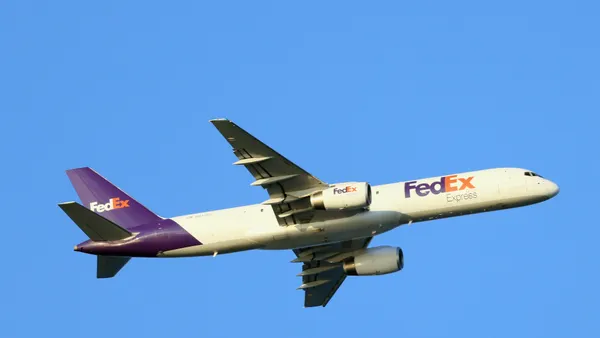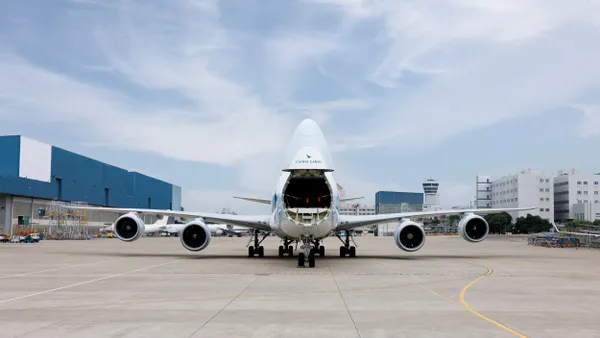Dive Brief:
- Amazon is set to launch a new strategic partnership with Canadian air freight line Cargojet, according to a recent press release. The two companies already have an existing relationship whereby Cargojet conducts overnight deliveries and offers charter services.
- The deal offers Amazon up to a 14.9% minority stake in Cargojet. The stake is contingent on Amazon providing business volume to Cargojet of a specified dollar amount.
- Cargojet hopes to achieve improved fleet utilization as a result of increased Amazon cargo loads, which will in turn support its ambitions to add more non-stop flights to the 15 major cities it currently serves and incorporate new cities into its overnight network, an expansion it says will grow its reach to "approximately 95% of the Canadian population," according to the release.
Dive Insight:
As air freight volumes decline due to global trade uncertainty, Cargojet stated in the release it expects the partnership to "generate additional revenue growth and be meaningfully accretive to Cargojet's earnings and cash flows over time." The company went on to cite expectations of continued e-commerce demand and growth potential for Amazon's rapid delivery options in Canada for its optimism about expanding its relationship with the retailer.
The agreement is also beneficial for Amazon as it can take advantage of Cargojet's broadening service network to gain access to more customers and lock in air freight capacity over the next few years. This will be especially beneficial to the retailer as it saw Prime membership rates grow 80% year over year in 2017. Amazon launched the service in Canada in 2013. Likewise, the number of Prime orders across the country doubled between 2017 and 2018, hinting at the future growth the company is seeking to capitalize on.
To achieve this however, access to air shipping modes is crucial given the fast delivery times Amazon's Prime memberships are largely based upon. While its partnership with Cargojet has the potential to deliver this in Canada, Amazon has been steadily amassing a domestic air fleet of its own as well. According to a statement from Dave Clark, senior vice president of worldwide operations at Amazon, the company currently has 70 planes in its Amazon Air portfolio.
In addition, the company has made significant investments in cargo hubs and carriers more generally as it looks to build out its two-, one- and same-day delivery logistics network across the U.S. Earlier this year, SEC filings revealed Amazon's plan to take up to a 40% stake each in two air cargo firms, Atlas Air Worldwide Holdings and ATSG over the next four years. Furthermore, the company has invested in brick-and-mortar operations and logistics facilities, breaking ground on a 1 million square-foot Operations Center of Excellence in Nashville, Tennessee, and a new regional air hub at the Dallas Fort Worth Alliance airport in 2018.
The move has some carriers rattled, as Amazon's growing network, customer base and faster delivery promises (often at cheaper rates relative to the rest of the industry) have made it a growing contender in the market. However, some such as Cargojet are looking to embrace the retailer's rapid growth, using it to increase their freight utilization rates and grow their own reach.














